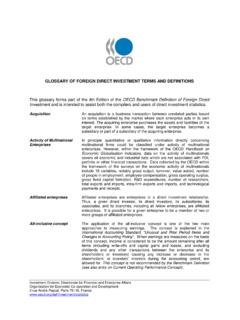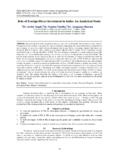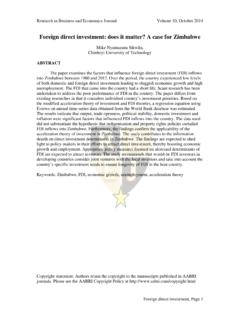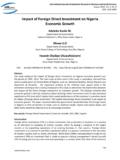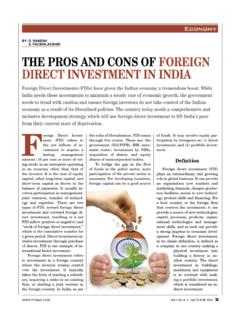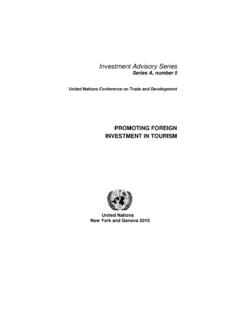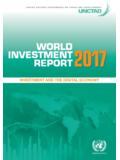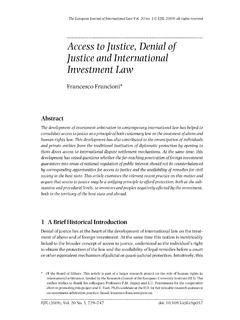Transcription of Foreign Direct Investment and the Environment - …
1 Foreign Direct Investmentand the Environment :From Pollution Havens to Sustainable DevelopmentA WWF-UK Reportby Nick Mabey and Richard McNallyAugust 1999 WWF-UK: FDI and the Environment : FDI and the Environment SummaryThe past decade has witnessed a sea change in Foreign Investment policy asgovernments, particularly in developing and emerging nations, have removed manyrestrictions on financial flows in and out of their countries. The greater mobility ofcapital, coupled with extensive privatisation and greater globalisation in production,has resulted in a five-fold rise in private Investment flows since Direct Investment (FDI) - Investment by Foreign companies in overseassubsidiaries or joint ventures - has a traditional reliance on natural resource use andextraction, particularly agriculture, mineral and fuel production.
2 Though this balancehas shifted in recent years, the poorest countries still receive a disproportionateamount of Investment flows into their natural resource past decade has also seen all trends of environmental degradation accelerate forexample, greenhouse gas emissions, deforestation, loss of biodiversity. Such patternsof environmental destruction have been driven by increased economic activity, ofwhich FDI has become an increasingly significant contributor. Flows of naturalresource based commodities and Investment are predicted to rise faster than economicoutput over the next twenty years. It is therefore critical to understand theenvironmental effects of private Investment and identify appropriate debates on FDI and the EnvironmentCurrently, much of the debate on FDI and the Environment centres around the'pollution havens' hypothesis.
3 This basically states that companies will move theiroperations to less developed countries in order to take advantage of less stringentenvironmental regulations. In addition, all countries may purposely undervalue theirenvironment in order to attract new Investment . Either way this leads to excessive(non-optimal) levels of pollution and environmental , statistical studies show that this effect cannot be clearly identified at thelevel of aggregate Investment flows. However, this report provides ample empiricalevidence that resource and pollution intensive industries do have a locationalpreference for, and an influence in creating, areas of low environmental paper also argues that the pollution havens debate has produced an excessivefocus on site-specific environmental impacts and emissions a few industrialpollutants.
4 This has deflected discussion away from macro-level issues such as: thescale of economic activity relative to regulatory capacity and environmental limits;broad development/ Environment linkages; and the complex policy and institutionalfailures linked to competition for FDI both between and inside regional trading a result of this skewed debate, FDI is often glibly characterised as environmentallybeneficial. Encouraging negotiators of economic agreements to argue against the needto introduce specific environmental clauses into international investor protection andliberalisation treaties. However, the economic growth produced by FDI is oftenWWF-UK: FDI and the Environment at the expense of the natural and social Environment , and the impact of FDI onhost communities and countries is often mixed in environmentally sensitive purpose of this report is to move beyond the pollution havens discussion, andexamine the broad interactions between FDI and the Environment .
5 This is done bydrawing on a range of empirical evidence on the impact of FDI, and examining itinside a comprehensive economic and policy model of sustainability. This analysismotivates proposals for a range of regulatory and market instruments that could helpFDI promote the transition to sustainability. The main conclusions of the report are setout below in two sections; the first summarising the analytical conclusions and thesecond outlining WWF=s policy proposals:Part I. AnalysisSustainable resource use is as important as local environmental impacts of FDI Economic theories of sustainability imply that economic growth and theproliferation of FDI will exacerbate existing unsustainable patterns ofdevelopment unless matched by more efficient use of natural resources.
6 FDImust operates inside absolute sustainability constraints based on the need topreserve vital ecosystem functions. Given the inherent uncertainties and possible irreversibilities in makingdecisions about the Environment , a precautionary approach to settingsustainability limits is necessary. Without limits in place even economicallyefficient use of resources is likely result in over-exploitation and over-pollution of the Environment . When increased flows of trade and the Investment exacerbate the existinginefficient use of scarce natural resources, economic benefits will be coupledwith environmental and social costs; particularly to the most the long term welfare implications of increased Investment will bemixed in many environmentally sensitive sectors.
7 The transition to sustainability requires policy changes that often go againstimmediate economic incentives for higher resource exploitation and responses will always lag behind economic pressures, especiallyin highly competitive global markets. As the source of many of theseeconomic pressures, developed countries have a responsibility to: reduceunsustainable consumption levels; provide resources to support environmentalgovernance in developing countries; and to ensure their companies operateresponsibly sequencing of effective regulation, empowerment and liberalisation is vital The irreversibility of much environmental damage means that over-hastyliberalisation can result in long-run negative impacts if regulation in the hostcountry cannot to respond to increased economic pressures.
8 Therefore, theWWF-UK: FDI and the Environment of building regulatory capacity and liberalisation is vital, and aprecautionary approach taken in sensitive areas. Where host country regulatorycapacity is lacking, developed countries have a responsibility to help improvethis in advance of any negotiations to open up new sectors to their investors. International financial institutions and export promotion agencies from sourcecountries tend to operate in countries where governance is weak. They have aresponsibility to review the Investment they support for its environmentalimpacts, and reject or amend projects if necessary.
9 The structure of currentinvestment subsidies encourages capital intensive and damaging Investment ,and should be reformed to help promote more sustainable industries. Poor and marginalised disproportionately suffer detrimental environmentalimpacts of Investment , especially when there is poor host country s and other civil society groups, from both home and host countries, canplay a vital role in articulating the interests of these groups. This requiresgreater transparency in public and private processes surrounding investmentdecisions, and increased access to justice both nationally and for FDI is clearly depressing environmental standards The pollution havens effect must not be conveniently aggregated away as aninsignificant determinant of total Investment flows.
10 There is clear evidencethat, even though full environmental costs are not internalised, certain resourceand pollution intensive industries have a locational preference for areas of lowenvironmental standards. There is also evidence that host countries do notenforce domestic standards in order to attract and retain investors, and thatinternational investors have often encouraged such behaviour. In some sectors - particularly areas of high technology - there is support for the>pollution halos= hypothesis; where FDI raises environmental , for most industries factors such as age, size and community pressureare more important in raising standards than Foreign involvement.










